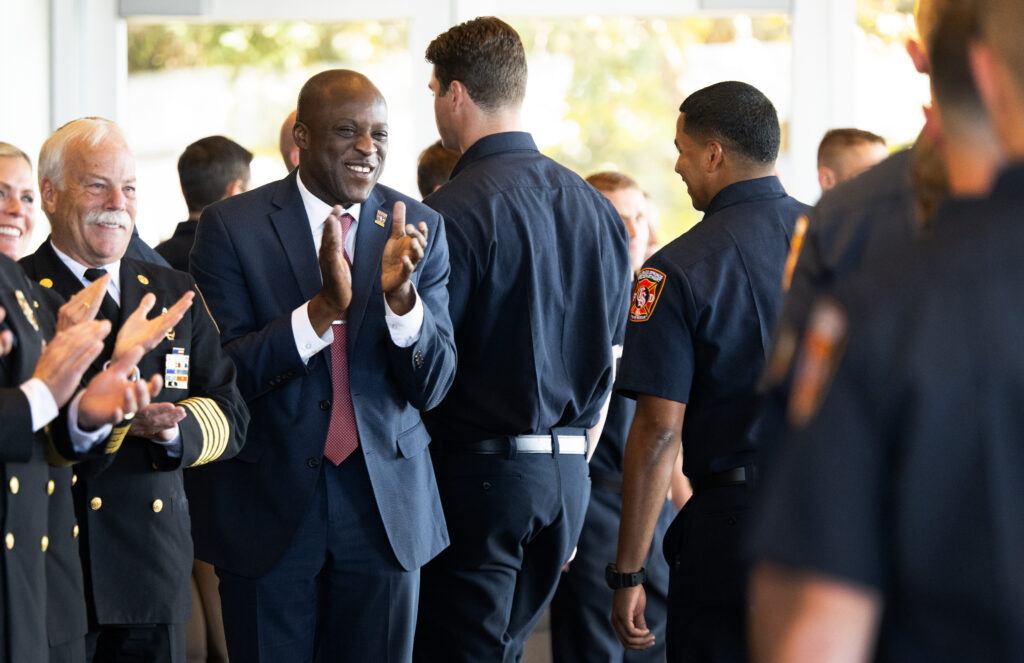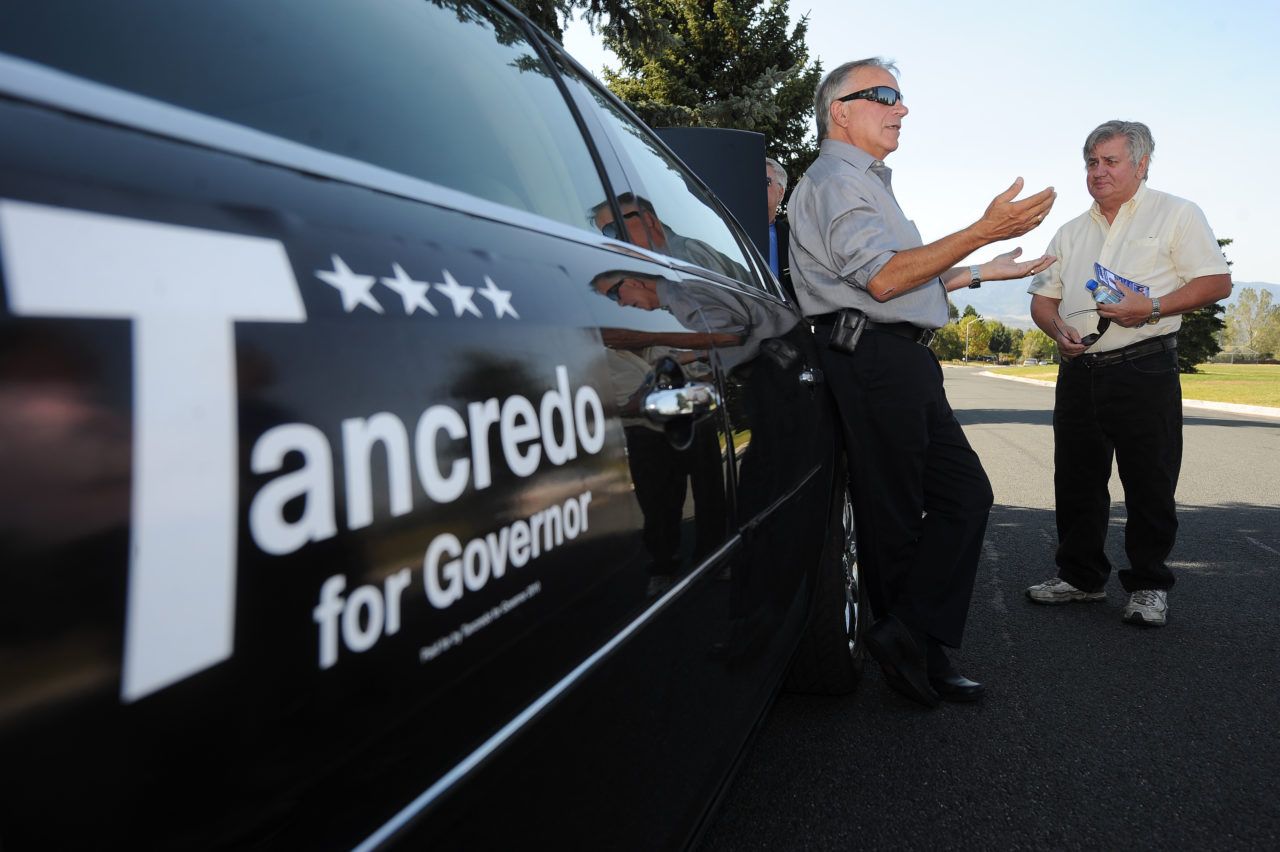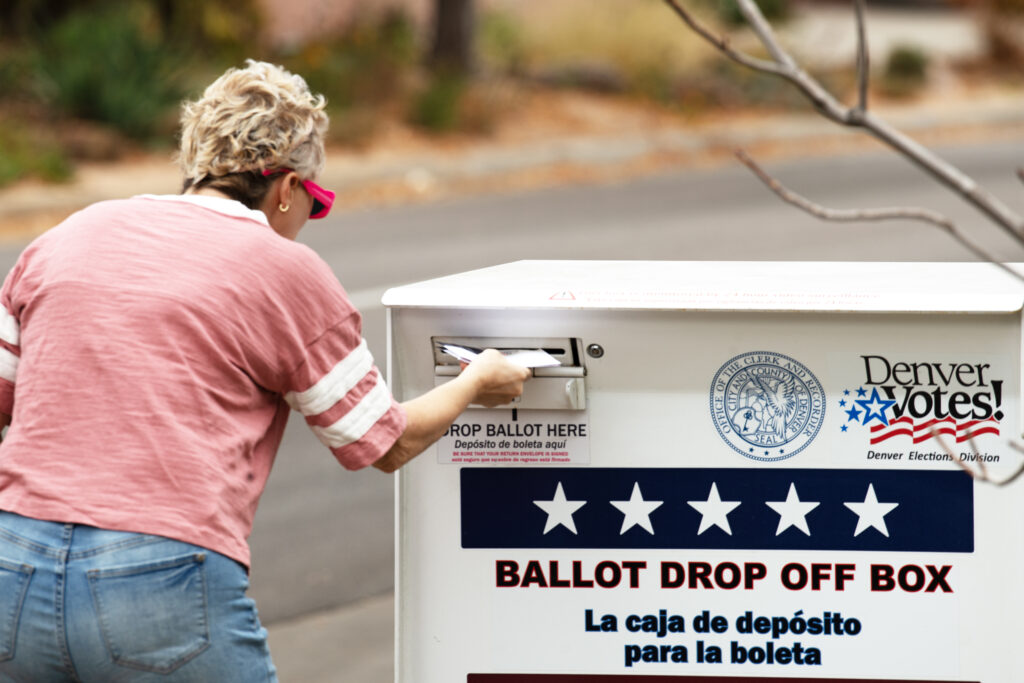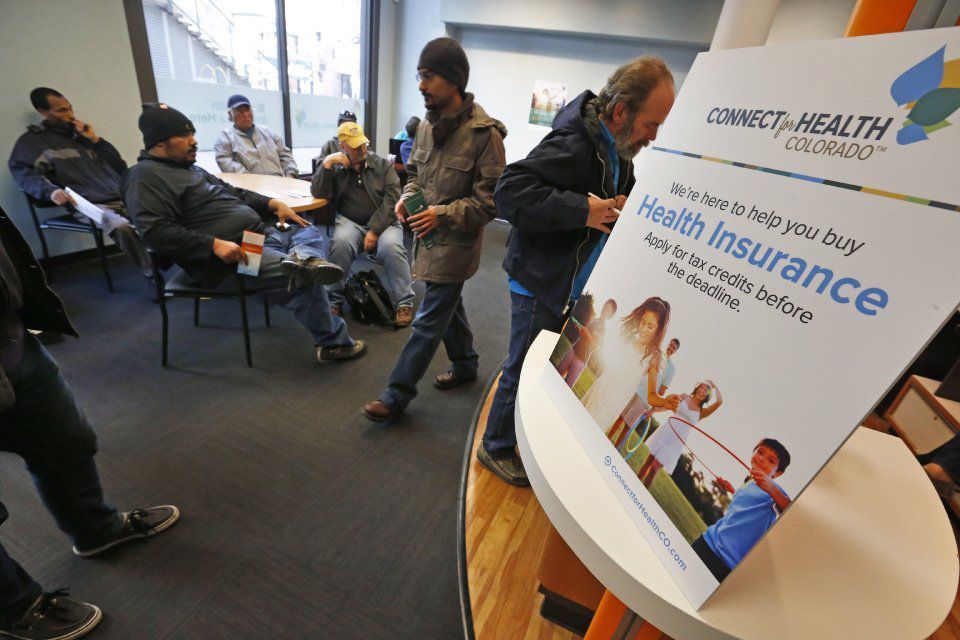Why winning as an independent remains a long shot, despite Colorado voters fleeing the two major parties

When Yemi Mobolade won the Colorado Springs mayor’s race in 2023, he made history as the city’s first independent leader — and gave new hope to voters frustrated with America’s two-party politics.
But even as unaffiliated voters now make up half of the state’s electorate, Mobolade’s victory remains the exception, not the rule.
The latest voter registration data from the Secretary of State’s Office shows that just under 50% of active Colorado voters are unaffiliated. Most voters are automatically registered as unaffiliated, unless they pick a party right away. Still, it’s no secret that many Americans are frustrated with the two-party system.
Colorado has eight officially recognized minor political parties, ranging from well-known groups like the Libertarian and Green parties to the lesser-known ones, such as the No Labels and Unity parties. About 2% of registered voters in the state are members of a third party.
Still, it’s rare for an independent or third-party candidate to win a race in Colorado, according to Democratic political strategist Jim Carpenter.
A MODERN HISTORY OF THIRD PARTIES AND INDEPENDENTS
Colorado had its fair share of third-party elected officials during its first few decades of statehood, from Populist Gov. Davis Waite to Attorney General Benjamin Griffith, a member of the Progressive or “Bull Moose” party.
Many of the third parties were absorbed by the two major parties following World War II, and Republicans and Democrats have since reigned supreme.
In 1998, third-party candidates got a clearer pathway to the ballot in Colorado following the passage of House Bill 1110. The bill defined minor political parties and distinguished them from the two major ones. It also presented multiple ways for a group to obtain that status: if one of its candidates for statewide office in the last two general elections received at least 5% of the vote, if at least 1,000 registered voters were affiliated with that party, or if the party submitted a petition signed by at least 10,000 electors.
That same year, the Libertarian Party and the Green Party were the first to attain official minor party status in Colorado following the law’s enactment.
According to the Secretary of State’s Office, one candidate from each party ran for state office in the 1998 Election: Dean Myerson of the Green Party vied for the University of Colorado Regent seat, and Libertarian Sandra Johnson ran for governor. Myerson received less than 1% of the vote, while Johnson received 1.68%.
Several Colorado lawmakers have also switched from a major party to a minor one — former Rep. Kathleen Curry became the first independent member of the state legislature when she left the Democratic Party in 2009. Eight years later, former state lawmaker Cheri Jahn of Wheat Ridge also left the Democratic Party, though she caucused with the Democrats until leaving the legislature in 2019.
In 2017, on social media, Jahn said the decision to leave the party was “very personal.”
“Since first being elected to the House of Representatives in 2000, I have watched our state and national politics become more partisan and polarized,” she wrote. “I have always brought an independent voice. I didn’t change, the system changed. This system is terribly broken. I have watched through the years and witnessed that there is more care about politics and those in power than serving people in the state.”
Then there’s Colorado Springs’ Mobolade, who took office in 2023 after becoming the first independent ever to win the seat. He also became the first Colorado Springs mayor not affiliated with the Republican Party in modern times.
In a 2024 interview, Mobolade told Politico he ran as an independent because he wanted to represent people who “don’t like the party chaos.”

Even before third-party candidates became more commonplace in Colorado’s statewide races, former Gov. Dick Lamm hoped to become the country’s first third-party U.S. president.
As a Democrat, Lamm served in the state legislature before becoming governor in 1974. He served three terms, becoming one of the longest-serving governors in state history.
In the mid-1990s, Lamm criticized both the Democratic and Republican parties, saying they were controlled by special interest groups with deep pockets. In 1996, he announced plans to serve as the Reform Party’s presidential candidate, joining the centrist party founded by Ross Perot.
Four years prior, Perot received just under 19% of the vote nationwide, and 23% of the vote in Colorado. However, when he beat out Lamm for the 1996 Reform Party nomination, his campaign was far less successful, receiving just over 8% of the vote nationwide. The Reform Party still exists today, but it does not have minor party status in Colorado.
The most successful third-party campaign in Colorado, at least by the numbers, goes to former U.S. Rep. Tom Tancredo, who left the Republican Party in 2010. He ran for governor as a member of the American Constitution Party, which espouses for a political system with a strong Christian bent.

While Tancredo was defeated by Democrat John Hickenlooper, a current U.S. senator for Colorado, he received just over 36% of the vote, qualifying his party for a major-party status. The American Constitution Party reverted to minor party status in 2014 after it failed to run a candidate in that year’s election.
That same year, Tancredo switched back to the Republican Party, though he left again in 2015 after losing the primary. In 2018, he entered the race yet again as a Republican, but withdrew before the primary.
‘IT’S JUST SO HARD TO BREAK OUT OF THE TWO-PARTY SYSTEM’
While getting on the ballot is relatively straightforward for a third-party or independent candidate in Colorado, running a successful campaign is not as simple, said Carpenter, the political strategist.
“It just doesn’t seem like there’s enough infrastructure there,” he said. “It’s just so hard to break out of the two-party system. A lot of it is money, and a lot of it is just institutional. Our politics are driven a lot by interest groups and affinity groups, and it’s hard to break through all of that.”
Some 65% of the funding for the 2024 election came from political action committees (PACs), according to USA Facts. These committees gave over $5.5 billion to political candidates and parties nationwide.
Here’s a more local example: In Colorado’s 7th Congressional District, incumbent Democratic U.S. Rep. Brittany Pettersen raised over $2 million in 2024 and won over 55% of the vote. Her Republican opponent, Sergei Matveyuk, hauled in nearly $57,000, while independent candidate Morgan Law secured only $47,000. Libertarian candidate Patrick Bohan raised about $5,700.
Name recognition also poses a challenge for third-party and independent candidates, Carpenter said. With Democrats and Republicans, voters have a sense of what they’re going to get, but understanding a third-party or independent candidate’s platform takes more time and research.
“A lot of voters try to focus on two or three issues, but there’s a sort of comfort level in that you sort of know in general where a Republican candidate’s gonna be and where a Democratic candidate’s gonna be,” he said.
Carpenter’s advice to minor party candidates and independents who want to run a successful campaign is to get out into the community and talk to people.
“You have to show up and you have to be at a lot of places and be very clear in who you are and why you’re running and make a case,” he said. “(Major party candidates) have the opportunity to get out there more and show their personality, their authenticity, or lack thereof, so there’s the ability to connect a little more personally with them. But you have to work really hard to find information about a third-party candidate.”
Carpenter believes Colorado Springs’ Mayor Mobolade’s community outreach efforts were part of the reason he was so successful. Others noted a divided GOP, whose nomination was secured by Republican City Councilmember and former Secretary of State Wayne Williams.
“There were a lot of dynamics, such as frustration with the Republican candidate, but (Mobolade) was out in the community a lot, and he worked very hard and I think he had a clear message, which obviously ended up being persuasive and successful, and I think that’s the formula,” he said.
Dave Ryan, chair of the Colorado Forward Party, agreed.
“Getting that message out is key,” he said. “When we talk to voters who are unaffiliated that would like a different option, especially the younger folks, they just want other choices. They want some other options and providing those other options is a big deal.”
Established in 2021 by former Democratic presidential candidate Andrew Yang, the Forward Party is Colorado’s newest minor political party. According to Ryan, the party operates on two main principles – “reinvigorating a fair, flourishing economy” and “giving Americans more choices in elections, more confidence in a government that works, and more to say in our future.”
The party advocates for election reform and increasing voter choice and representation, and it has drawn members from across the political spectrum, including former Democrats and Republicans who said they are tired of the two-party system dominating American politics. The party is currently qualified for the ballot in five states and is recognized as a minor party in seven more, including Colorado, where it obtained that status last year.
Ryan said the Forward Party attracts people looking for something different.
“They don’t see themselves represented in either major party, or they’re just frustrated because they see what we call a duopoly of the two major parties that raise tremendous amounts of money just to stay in power,” he said.
Ryan called the current system “purity politics,” arguing that both parties are constantly searching for candidates who are “the furthest to the right or the furthest to the left” to win primaries.
“It just creates this awful dynamic and feedback loop, so we feel that the system actually has to change to be successful,” he said.

Matt Cavanaugh, an independent who is running for Republican U.S. Rep. Jeff Crank’s seat in the 5th Congressional District, said the major parties have become “deeply entrenched tribes,” particularly at the highest levels of government.
“Congressional Democrats and Congressional Republicans hate each other more than they love the Americans that they serve,” he said, pointing to the recent federal government shutdown, the longest, as an example.
“I think as long as we live in the circumstances we’re living through right now, where government literally won’t work because the sides won’t talk to one another, you’re going to continue to see people searching to break out of that straightjacket,” he said. “And they should.”
Cavanaugh noted recent polls showing more than 60% of voters in the 5th CD said they would be open to voting for an independent or third-party candidate, which means the potential to replicate Mobolade’s success in 2023.
“There is an opportunity in this district for an independent,” he said. “I don’t accept the traditional measures or metrics that the Republican and Democratic Party apply to campaigning. We have to be honest – the Democratic and Republican parties don’t solve enough problems for our country in order to deserve the monopoly they have,” he said. “They’re not doing our country any service by continuing to give us these flawed candidates.”
THE SPOILER?
Defenders of the two-party system have argued that America has enjoyed political stability since the system emerged in the mid-1800s, producing a stable transfer of power and the ability to deal with a major crisis.
At the opposite end of the spectrum is a multi-party system, which, they say, results in more instability or gridlock, since it often means fragile coalitions to form a government. A clear legislative majority, produced by a two-party system, also means the government is more efficient in passing laws or adopting a spending plan.

And because election in America is won by a plurality of votes – and the political unit, such as a district, is represented by a single member, rather than via proportional representation – the country favors a two-party system. That is, voters gravitate toward the Democratic or Republican candidate as the most viable option, rather than a third party who might only serve as a “spoiler.”
Ryan, of the Forward Party, pushed back on a common criticism of third parties known as the “spoiler” effect, in which a third party or independent receives votes that would have – according to this theory – otherwise gone to a major party candidate, thereby “spoiling” their chances of winning. Many have pointed to the 2022 election in the 8th Congressional District, in which Republican State Sen. Barbara Kirkmeyer lost to then-Democratic Rep. Yadira Caraveo by less than 1 percentage point.
In Ryan’s view, had Libertarian Richard Ward not entered the race, the roughly 9,000 people who voted for him likely would have chosen Kirkmeyer, and she would have won.
The problem, he said, is that ranked-choice voting is not in place.
“Because we don’t have an approval voting or ranked-choice voting system, it was a spoiler effect,” he said.
Ryan and his fellow Forward Party members believe election changes could give third-party and independent candidates a better chance of gaining traction with the electorate. They advocate for ranked-choice voting, in which voters rank candidates in order of preference, rather than voting for just one. Numerous permutations of ranked choice voting exist.
“We have to address the basic system of how we elect our officials in partisan elections,” Ryan said. “We haven’t modified our electoral processes probably since the 1960s, and it’s not that we’ve never changed how we elect people, it’s just that we haven’t done so in the last 60 years.”
Colorado voters rejected the ranked-choice system in the 2024 election.
Ryan said he knows 2026 won’t be the year of the Forward Party, or any third party, for that matter, but he’s OK with that.
“When I signed onto this, I looked at it as a 10-year project,” he said. “Politics are about relationships and trust, so that’s the road that we’re on, just building those relationships and trust one person at a time, and we’ve had some pretty good success with that.”
















